Over the past decade or so, Turkey, a critical NATO member and once-aspiring candidate for membership in the European Union, has refashioned itself as a revisionist power openly challenging not just its regional neighbors but also treaty allies like France and the United States.
Currently, Turkey’s military—NATO’s largest after the U.S.—is actively involved in a number of theaters, including Syria, Iraq, the South Caucasus, Libya and the Eastern Mediterranean, with the intention to either steer the outcome of a dispute in its favor or alter the existing order. This behavior represents a radical change from Turkey’s earlier predilection for a foreign policy that embraced the status quo and that mostly eschewed foreign adventures.
The chief engineer of this shift is Recep Tayyip Erdogan, first as Turkey’s prime minister, from 2003 until 2014, and then as president. While the transformation of Turkish foreign policy under his leadership did not follow a linear trajectory, it was dominated by two overriding features: first, Erdogan’s ambition to thrust Turkey, and by extension himself, into a global leadership role; and second, to always utilize Turkey’s new activist foreign policy as a method to enhance the regime’s domestic legitimacy and ensure its survival.

